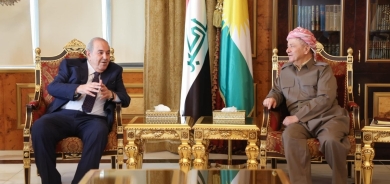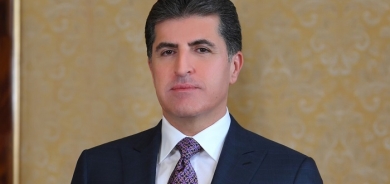Andreas Krieg: Local communities in Iraq, whether Shia, Sunni, Arab, Kurdish, Yezidi or Christian, need to feel empowerment in order for ISIS to be defeated
June 17, 2015
Exclusive Interviews

Gulan: One exact year is passing over the establishment of Islamic caliphate by ISIS terrorists. This year they are controlling more territories and they have better abilities than last year. In your opinion, the ISIS controlled territory is a land-lock with no borders and sea. In addition, they don’t have airports. What is the secret of ISIS’s strengthening and extending?Gulan: One exact year is passing over the establishment of Islamic caliphate by ISIS terrorists. This year they are controlling more territories and they have better abilities than last year. In your opinion, the ISIS controlled territory is a land-lock with no borders and sea. In addition, they don’t have airports. What is the secret of ISIS’s strengthening and extending?
Krieg: Key to ISIS success is the weakness of the state authorities in the region. Both Syria and Iraq are failed or failing states where ISIS can provide an alternative socio-political narrative to the existing chaos–this is something that appeals to certain communities, particularly Sunni Arab communities. Plus, ISIS is a very well-organized and structured organization whereby chains of command and leadership is often delegated to the local level providing local leaders with the discretion to achieve objectives as they see fit. At the same time ISIS can rely on a strong component of former Baathist military and intelligence personnel. These people are highly professional, goal-oriented and eager to take revenge against a regime that they see as having taken from Sunnis what was rightfully theirs.
Gulan: Middle East has become a huge international violent zone and experts think that the region is heading towards a bloody war between Sunnis and Shiites. In your opinion, where is the violence in Middle East heading to?
Krieg: Sectarianism is a huge problem in the region. It has been steered up by outside forces who are trying to create a narrative for their fight. But I think the key struggle in the region is probably between the Arab World and Persia. Disunity in the Arab World has exposed Arabs to the expansive policies of Iran. The Arab League and the GCC should act more comprehensively and unitedly to solve problems in the region instead of relying solely on US or Western assistance. The clash between Sunnis and Shia is artificially blown out of proportion. It is an excuse for more interests-related motivations.
Gulan: States in Middle East are not just failed states, but the state system has been failed in this area in the way they cannot preserve their sovereignty. To what extent is it easy for international community to change state system or to re-organize the state borders in order to return stability to the area?
Krieg: The state system that has been imposed on the region from the outside is artificial and not sustainable. The borders follow old realities of Great Power interests that are not relevant anymore in face of changing socio-political realities on the ground. The international community, however, remains state-centric and very hesitant to set a precedent by allowing borders to be changed or states to disintegrate on power – all this while in reality, de facto, Syria, Iraq, Libya and Yemen have seized to exist as states.
Gulan: Among the changes that are expected to happen in Middle East, we see that there are different Arabic, Turkish and Iranian projects, in particular while Saudi Arabia, Iran and Turkey are willing to have their trace in the future of the area. How can the west maintain a balance between all these projects in the area?
Krieg: I think there are three projects at the moment. Turkey, Saudi Arabia and Qatar have one project that is partially supported by the West. The UAE and Egypt have another project that is also partially supported by the West. The Iranian project is the more powerful one as it is based on a single unitary leadership and strategy. Iranians have a clear strategy of gaining influence where Arab states are losing influence.
Gulan: United States is doing its best for preserving unity of Iraq, but on the real ground Iraq has been divided in which Iraqi government has authority only in Baghdad and Shiite provinces in the south. In other words, the government is representing only Shiite people of the country. Don’t you agree that American insisting on the unity of Iraq is serving Iranian interests by letting Iraq further turn into an Iranian extension?
Krieg: The current system in Baghdad is not an inclusive system, which represents sectarian interests. It has lost its legitimacy in the eyes of the international community and local communities. Despite the fact that Abadi is trying to reach out to all sects in Iraq, he is heading a state apparatus that remains dominated by sectarian Shia interests. Abadi is still leading a system that has been built up by his predecessor Al-Maliki. The US should revise its support for the current government or at least make support conditional on the government’s actions to establish a more federal system within Iraq.
Gulan: Kurdish question is one of the suspended problems in Middle East. Currently it is only the Kurds who have been able to defeat terrorism on the ground. Moreover, Kurds are having some values in common with United States and The West and want to be independent. In your opinion, to what extent is the establishment of independent Kurdistan important for defeating ISIS terrorists?
Krieg: Kurdish independence is not a solution to the fight against ISIS in itself. I think that Iraq needs to be rebuilt as a federal socio-political system whereby power is delegated from Baghdad to provincial capitals. The KRG remains an important part of Iraq and its autonomy is a good role model for how other provinces can be restructured in the future. However, there are many economic and security-related questions that are still open.
Gulan: How do you see post-ISIS Middle East if international coalition succeeds defeating them?
Krieg: ISIS is more than an organization. It is an idea and a narrative. This narrative can only succeed if the root causes of it remain in place, i.e. marginalization and disenfranchisement. So even if ISIS will be defeated, a new idea or movement will come along as long as the state fails to deliver security and social justice inclusively. Local communities in Iraq, whether Shia, Sunni, Arab, Kurdish, Yezidi or Christian, need to feel empowerment in order for ISIS to be defeated.















